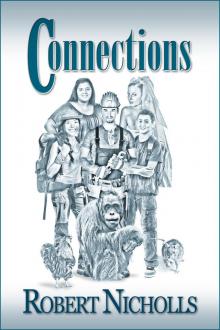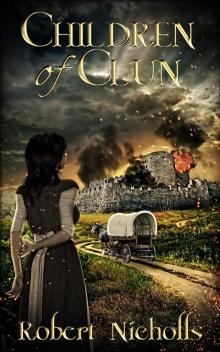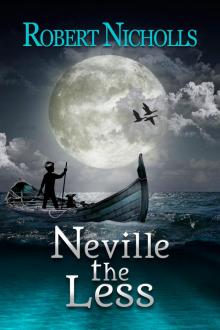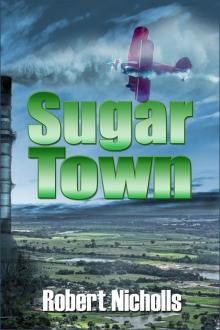- Home
- Robert Nicholls
Children of Clun Page 3
Children of Clun Read online
Page 3
“Some ‘at’s definitely comin’!” she whispered aloud and he stepped back, out of sight.
Ordinarily the gates were a subject of great mirth for the villagers – had been ever since their hasty repair after Glyndwr’s sacking of the castle, those many years ago.
“Might as well knock ‘em down for firewood!” one’d say. “Them gates is long past usin’.” “Wouldn’ keep a flock o’ geese out of that castle,” another would add. “No use closin’ ‘em! I’d wager my nanny goat could knock ‘em flat!” and “A fart from my donkey! That’s all it’d take!”
Maude stood, frozen in the roadway, thinking how nice it would be if this ceremonial closing was all Branwen had brought her to see – all that the villagers were gathering to see. But she knew it wasn’t so. Partly because Branwen had already run ahead and was now racing back to hurry her up.
Far back in the bailey, she feared, Gwilym would be uncontrollable with rage when he found her gone. She should pound on the gate and demand to be let back in. But that would mean drawing so much attention to herself! Besides which, why would anyone listen? She’d just have to try to explain. Maybe there’d be a bruise on her bum that she could show to prove her story! She couldn’t know that, before she spoke to her father again, the season would have changed, far bigger bruises would have been inflicted on far more important people and the village of Clun would be a very much different place.
* * * *
A nearly impassable crowd of villagers had assembled on the track outside the gates. Usually people in crowds are as aimless as butterflies. But not in this one. Every head in the crowd was facing the same direction with the same slack-mouthed, gob-smacked expression. They looked, Maude thought, the way they might if Father Reginald brought a camel in for Communion.
Branwen put her hands on Maude’s shoulders and jumped, hoping to get a glimpse. But then, with the gates slumping wearily behind them, as though they’d only been waiting for Maude’s attention, the crowd gave a whispered sigh and moved to left and right of the road. And right there, sauntering along directly toward them, as though such things happened every day of the week, were travellers!
Two separate bands of travellers, in fact! One from the south and one from the north! Trundling into Clun on exactly the same day, at exactly the same time! And add to that the little cart which, on being reminded of it, Maude twisted to look for. (It was there, on the Common, the pony unhitched and grazing!) And add again Sir Roland’s arrival yesterday! It was unheard of! So much activity in Clun – even in a month of Sundays – was as unlikely as . . . well, as unlikely as a pony and cart materialising out of a dream!
And travellers when they did come were generally dreary monks or down-at-heel merchants or stony-faced soldiers on far-flung assignments! But both these small groups contained caparisoned horses! There were flashings of steel and gorgeous fabrics of blue and green and yellow! Maude was so astonished that she might well have been trampled if Branwen han’t wrenched her out of the path of those prancing horses.
The group from the north had entered the roadway first; just three women and a man. Two haughty, dark-haired girls of eighteen or twenty years, mounted side-saddle as was proper for ladies, and towing packhorses, drew much attention to themselves by peering and pointing rudely, as though the villagers were strange fish in a shallow pond. Behind them the third woman sat astride an unusually large chestnut mare that shied and swung its rump at the close packed villagers. And the saddle that she occupied was a man’s saddle!
“Ohh, now!” muttered a toothless old watcher. “What’s better’n an’ ‘ansome woman on a fine ‘orse?”
The crowd had clearly unnerved the animal but the woman held it with an air of careless ease, all the while chatting serenely to the knight who rode beside her on a massive stallion, nodding agreeably down on both her and the crowd. There was a sense of weariness about the knight – possibly as a result of his being the company’s only apparent concession to the dangers of the Marches. He it was who answered the challenge from the sentry and set the villagers’ tongues to wagging.
“Sir Angus, a knight of Atholl!” he announced. "Guide and protector of the Lady Mary Gordon, on a pilgrimage to the shrines and holy places of the West Country! We crave admittance to Clun Castle!”
“Scots?” spat the same toothless one. “Did ‘e say Scots? Clan Gordon, was it?”
“It was!” came an answer. “Now what would Scots be doin’ in the West Country, I ask ye?”
“Brewin’ trouble,” chipped in a third. “Scots is always brewin’ trouble, if my opinion’s asked.”
“No one here is foolish enough to ask your opinion, man. As well ask a duck what it thinks of an ox, for all the meaningless quack ye’d get.”
All this went unseen and unheard by Maude. She didn’t hear the muttered commentary, the answer from the sentry towers where Eustace stood or the gates grinding back open to admit the Scots. She missed it all because her whole attention was focussed on finding one individual who, the voice in her mind promised her, was destined to sparkle above all the others. And that individual was not in the first group.
She was, however, unmissable in the second group, which was also a foursome – this time, two knights and two girls. From her first glimpse through the crowd, Maude was entranced. It wasn’t the girl’s wide-eyes or her seriousness or her youth – perhaps sixteen or seventeen. It wasn’t the way she shaded her eyes or rose in her stirrups to get a glimpse of the group ahead. It wasn’t the richness of her cloak and saddle or even the jewelled belt at her waist.
It was the web of ribbons that held her hair! Ribbons beyond imagining!
Maude’s head spun. The colours! Were they ribbons? For a long, consuming moment, until the girl drew near, Maude thought she was seeing a crown! A fabulous crown! A queen’s crown!
When this group stopped to answer the gatekeeper’s challenge, they were so close that, if Maude and the strange girl had both reached out, their fingertips could have touched! Like leaves on the furthermost branches of two trees. But of course, like trees, each was firmly anchored in her own place. Bend how they might, the distance could not be breached. Not even with their eyes. Not yet.
“Who seeks entry to the Castle of Clun?” sang out the gatekeeper and this time, Maude heard the murmur of laughter that rippled through the crowd. Challenges at the gate had once been commonplace, but these days it was more likely to be village kids shouting down at playmates. Obviously Sir Roland had left his eyes at his fancy castle in Herefordshire! Either that or Samuel Rowe’s ambitions had finally spoiled his thinking apparatus. Or . . . and this was a sobering thought . . . these visitors were far more important people than even their flashy presentation suggested!
For the moment, only Maude knew the truth of the matter. But the others were about to learn it as, in answer to the challenge, one of the two accompanying knights stood in his stirrups. He was an extraordinarily imposing man. Like a giant, upright bulldog, he was all shoulders and chest – a man who could crush an oaken barrel in his arms or snap a winter apple in half with his hands. The sound of his voice, coarse and disdainful, finally drew Maude’s gaze from the girl.
“Sir Cyril Halftree, knight of the English realm!” he shouted. “Escort to Lady Joan de Beaufort, daughter of Sir John de Beaufort, First Earl of Somerset; grand-daughter of John of Gaunt, the Duke of Lancaster. Her Ladyship seeks entry and protection in the . . . uh ” (he glanced disparagingly along the little castle’s frontage) “castle of Clun.” He sat back in his saddle, hocked up a wad of phlegm and gobbed it down amongst the peasants.
Utter silence descended on the crowd, like a mist of flour. Indeed, many were left pale with astonishment. Not because of the spit but because, in England, in 1421, titles were symbols of unimaginable power and privilege. Everyone knew that dukes stood next to princes, princes next to kings and kings next to God. By association, Joan de Beaufort – whose step-father, only recently killed in France, had been brother to Kin
g Henry himself – though she was little more than a child, made the knees of grown men cry out to touch the dirt. Many in the crowd of villagers crossed themselves and whispered a word of thanks to God for having spared them to witness a living person of such greatness.
They were reminded, not of their own humble stations in life, but rather that the world was indeed a grand, enormous and amazing place. Surely precisely the purpose for which God had invented magnificent people! If the day had ended at that moment, this wonder alone would have kept Maude’s head spinning for years. But there were two more wonders to come. The next to last happened when the second knight in the company of visitors made his own introduction.
In an unmistakably French accent, he called, “Perceval de Coucy-Guines, Sieur d’Aubermont, companion of Lady Joan de Beaufort, travelling with his esteemed wife, also craves entry to the fortress of Clun.” Mutterings raced through the crowd like swallows through an evening sky.
“De Coucy? Did he say ‘De Coucy’?”
“’Course not, you cloth-eared idiot. It wouldn’t be possible, would it!”
“The coat of arms! Look at the coat of arms!”
This time, Maude was listening. She tugged at a sleeve. “What is it? What does it mean?”
A snaggle toothed face, with eyes as wide as an owl’s, came down near her own.
“The greatest knight in the world, girl! Richer than kings! Holier than the Pope! That was the old man, de Coucy! Died in a Crusade against the Turks, they say! See the coat of arms?” His own arms both swung up to point, as though one arm could not be sufficient to the task. “The upside down crown! That’s the old man’s insignia! But the bars are tilted the wrong way, see? That’s the bar sinister! They says he’s a bastard of the old knight! Bless us all, the world’s gone mad! The king’s niece and a de Coucy! In Shropshire!”
Maude’s eyes swivelled back to the knight. He was an entirely beautiful man and, on the instant, she determined to lock everything about him into her memory; to collect portions of him like ingredients for a pie that she could later, at her leisure, reassemble and devour. Into the basket of her mind, she scooped the damp earthy glow of his hair; the straightness of his back as he sat in the saddle; the casual way the reins lay across his palm; the quilty bulge of jacket over his shoulders. She was still gathering in the bold swell of calf muscles beneath his hose when the cortege responded to the sentry’s welcome and began its slow creep into the courtyard.
And then the last wonder happened.
Jenny Talbot, a free woman who served as head of the castle’s kitchens, appeared beside them. She already smelled of steam and roasted meat and strange spices. Maude shrank away, acutely conscious of, and embarrassed by, her own lingering odour – pig and old straw.
“Well,” said Jenny Talbot, “these two girls might be ‘zactly what’s needed!”
She reached out her pudgy hands to grasp Maude and Branwen by their chins, turning their heads roughly from side to side. “Yes indeed!” she nodded, speaking more to herself than to them. “Believe they’ll scrub up well enough! Take ‘em to the kitchen. See if they can carry soup without sloppin’. If not, Sir Roland can cut off their little girl fingers. Feed ‘em to his ‘ounds. Yes ma’am.”
She placed her hands on top of the girls’ heads and pushed them past her, as though she was a small boat and they scoops of water. “To the kitchens!” she said. “Clean you up! Then to work! Lots an’ loads to do!”
For a moment, she seemed to fall into a reverie, gazing down the hill to the tiny village and the checkered fields beyond. “Jus’ like the old days,” she hummed. “The old feastin’ days.”
Maude drew a frantic breath – about to beg to be excused – to be sent back to her father, but her tongue seemed to cleave to the roof of her mouth. She sensed clearly – knew that it was important not to intrude on – the vision that Jenny Talbot was seeing, somewhere beyond the village and fields of Clun. An earthquake of a sigh suddenly shuddered through the woman’s bosom and she turned, shooing the girls along before her.
Chapter 4 - Forest and Hall
Under a tree, beside a stream, just inside the edge of the forest, Roger Ringworm and Wild Jack Sorespot rose, shivering, to a new day. Though it was summer, the dew had been heavy and their ancient woollen rags were little more than threads, holding together an array of holes and rips. Jack prodded the remains of last night’s fire but knew he daren’t light it up. If the smoke were seen, Gwilym, the reeve of nearby Clun, would be onto them in a twinkling, and they’d have to run for it. Having chosen to live outside the towns and villages, they were free of all constraints, but freedom from service came at a high cost.
“What’s for breakfast?” said Roger.
“Nuthin’,” said Jack.
“I’d give my last tooth for a bit o’ meat,” said Roger.
“Ba-a-ah,” came the distant bleat of a goat.
Three of Jack’s and Roger’s eyes met. (The fourth one – Roger’s left – always squinted off in a different direction – nearly as bad an omen as meeting someone with red hair! Which made them a particularly ominous pair, because, like Maude’s, Jack’s hair was as red as a newly washed carrot!) Their stomaches growled at one another and the boys shared a mouth-watering vision of a haunch of goat, roasting over their evening fire.
Madeleine and Anwen had led the goat and the pig into the fringe of the forest, only a little out of sight of the castle. What could it hurt, Anwen had demanded in her fearless way. Ten steps! Maybe twenty! There was a grove of oaks, under which lay a scattering of late acorns – as good as new turnips to the animals. The sisters had lain back against a tree’s trunk and Anwen had stuck a pair of apple seeds onto her forehead.
“This un’s Rhodri,” she said, pointing at one, “an’ this un’s . . . Hubert! Firs’ one drops off don’ love me enough to be considered!”
“Don’ know why ye’d consider either one o’ them useless no-goods,” Madeleine said listlessly. “What’ll ye think if neither one of ‘em drops off? Or if they both drop off at once?”
Anwen smiled knowingly, as though she’d already considered those possibilities. Then her manner became suddenly serious. “I wish ye weren’t so unhappy, Maddie! The world mus’ seem an awful place when you’re so sad! Them village boys – they ain’ nuthin’ to crow about, I know – but they ain’t really so bad, neither! Couldn’t ye maybe give one of ‘em a chance? An’ da’ too? He jus’ truly wants what’s best for us, I think. He maybe don’ know what that is yet, but he’s tryin’, ye know? Everyone’s got to try, doncha think?”
“Oh, open yer eyes, Annie! He’s gonna marry you off – an’ me and Maude off – to nose-drippin’, smell-bad, no-hope boys we don’ even want, an’ our whole lives are gonna be nuthin’ but havin’ kids an’ listenin’ to stories o’ what Clun use to be! It won’t matter a sheep’s arse whether yer tryin’ hard or standin’ on yer head! If you can be happy about that . . . fine! I jus’ wish some‘ut ‘ud come along to lift me out of it, that’s all!”
* * * *
That was the moment when Jack and Roger burst from the undergrowth. They lunged recklessly at the animals which bolted from the clearing and quickly disappeared, back in the direction of the village. If Madeleine and Anwen had been a little more like Maude, there would have been little girl feet pounding along beside goat hoof and pig trotter, but neither of these sisters was given to running from boys. Their feet stayed connected to the ground, even as two little hands snaked out and ten little fingers intertwined – just for the courage that contact can give. The boys, groaning with disappointment, turned toward them and Annie carefully spat over two fingers of her free hand, to ward off the evil in Roger’s crossed eyes.
Jack and Roger both grinned grimly, Roger showing his last remaining tooth and goggling his eyes in the looniest fashion he could manage. Sometimes he quite enjoyed the effect he had on people. It was nice to be noticed – nicer still to be feared.
“Well well!” said Jac
k. “It’s a little late to be spittin’ for luck, girlie! Youse an’ yer animals’ve jus’ come to the attention of a pair o’ desperate men!”
“Desperate men?” chided Madeleine in her most defiant voice. “If yer meanin’ youse two, then ye’ve been sleepin’ on the groun’ too long! Earwigs get in yer brains when ye do that, ye know! Youse two – youse’re jus’ that pair o’ thievin’, scoundrel boys – Roger Ringworm and Wild Jack Sorespot! Aren’t yez!”
The origin of the “ringworm” part of Roger’s name was obvious from the bare circles of skin showing through his hair. He didn’t mind. And the ‘Wild’ part of Jack’s name was of his own devising. He was very pleased to hear it used.
“Think ye’re pretty clever, do ye?” he sneered.
“Cleverer ‘n you, by half!” Madeleine couldn’t stop herself. “Clever enough to holler up a gang o’ villagers who’ll nail your skins if they catch yez! So ye’d best be scamperin’, hadn’t ye! Right now! I’m warnin’ ye! Go on!”
“You holler all ye want, girlie!” Jack smiled, fully aware of how far they were from the village. “Me ‘n’ Rog’ – we ain’ afeared! Look ‘ere!” He pointed to his red hair and to Roger’s crossed eyes. “Anyone gets in our way, we got bad luck aplenty to give ‘em!”
“Yeah?” countered Madeleine. “An’ what’s all them?”
She pointed to a collection of bits on strings around Roger’s neck. There was an iron nail, thrown from a horse’s shoe. There was a mole’s foot, a bent coin and a bit of rowan wood, wrapped around with red thread. There was a lucky bone from a sheep’s head – all powerful charms for warding off illness, bad luck and witches.
“Maybe yez got so much good luck in them charms ye think ye’ve cancelled out all yer bad luck, eh? When really yer jus’ ordinary, stupid boys! Wi’out even enough sense to get a fix up fer some ringworm!”

 Connections
Connections Children of Clun
Children of Clun Neville the Less
Neville the Less Sugar Town
Sugar Town